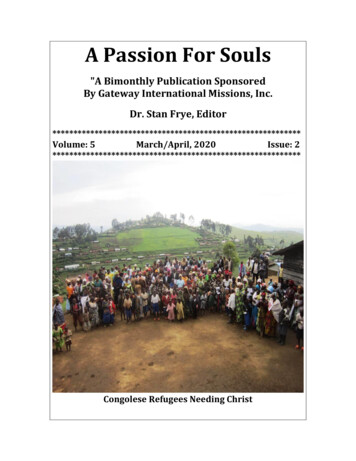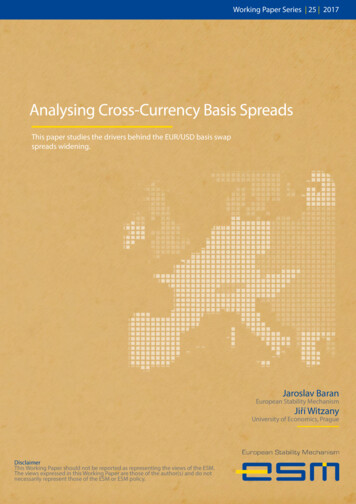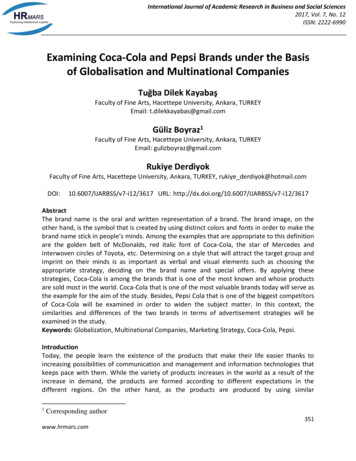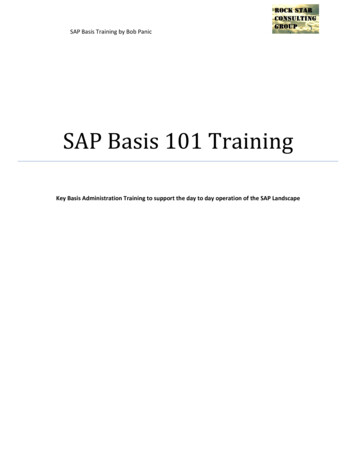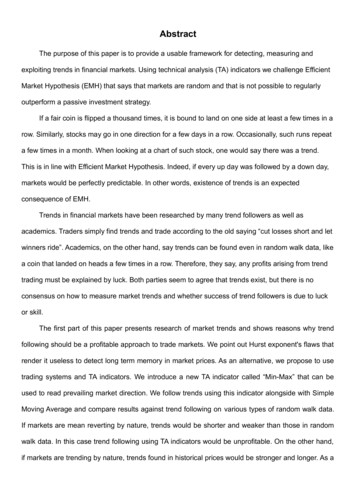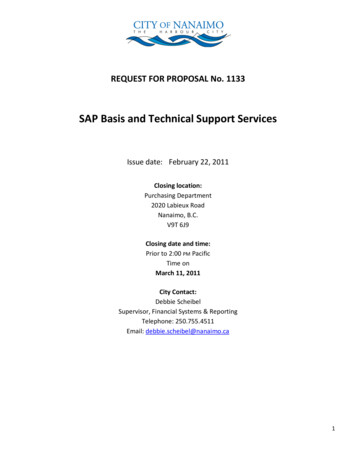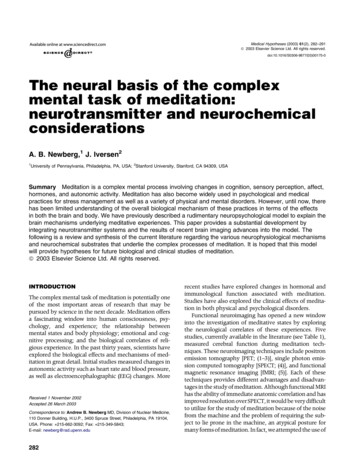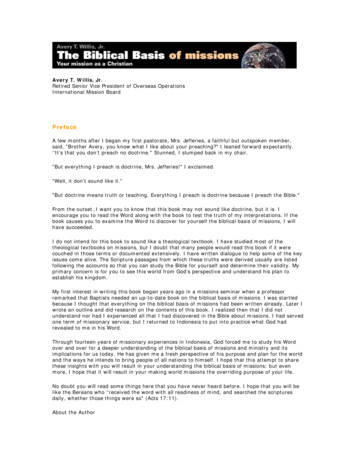
Transcription
Avery T. Willis, Jr.Retired Senior Vice President of Overseas OperationsInternational Mission BoardPrefaceA few months after I began my first pastorate, Mrs. Jefferies, a faithful but outspoken member,said, "Brother Avery, you know what I like about your preaching?" I leaned forward expectantly.‘‘It’s that you don’t preach no doctrine." Stunned, I slumped back in my chair."But everything I preach is doctrine, Mrs. Jefferies!" I exclaimed."Well, it don’t sound like it.""But doctrine means truth or teaching. Everything I preach is doctrine because I preach the Bible."From the outset, I want you to know that this book may not sound like doctrine, but it is. Iencourage you to read the Word along with the book to test the truth of my interpretations. If thebook causes you to examine the Word to discover for yourself the biblical basis of missions, I willhave succeeded.I do not intend for this book to sound like a theological textbook. I have studied most of thetheological textbooks on missions, but I doubt that many people would read this book if it werecouched in those terms or documented extensively. I have written dialogue to help some of the keyissues come alive. The Scripture passages from which these truths were derived usually are listedfollowing the accounts so that you can study the Bible for yourself and determine their validity. Myprimary concern is for you to see this world from God’s perspective and understand his plan toestablish his kingdom.My first interest in writing this book began years ago in a missions seminar when a professorremarked that Baptists needed an up-to-date book on the biblical basis of missions. I was startledbecause I thought that everything on the biblical basis of missions had been written already. Later Iwrote an outline and did research on the contents of this book. I realized then that I did notunderstand nor had I experienced all that I had discovered in the Bible about missions. I had servedone term of missionary service, but I returned to Indonesia to put into practice what God hadrevealed to me in his Word.Through fourteen years of missionary experiences in Indonesia, God forced me to study his Wordover and over for a deeper understanding of the biblical basis of missions and ministry and itsimplications for us today. He has given me a fresh perspective of his purpose and plan for the worldand the ways he intends to bring people of all nations to himself. I hope that this attempt to sharethese insights with you will result in your understanding the biblical basis of missions; but evenmore, I hope that it will result in your making world missions the overriding purpose of your life.No doubt you will read some things here that you have never heard before. I hope that you will belike the Bereans who ‘‘received the word with all readiness of mind, and searched the scripturesdaily, whether those things were so" (Acts 17:11).About the Author
Avery T. Willis, Jr. is well qualified to write this text. He is presently manager of the AdultDiscipleship Training Section of the Discipleship Training Department of the Sunday School Board.This places him in a position to be in touch with the training needs of people. Dr. Willis came to theSunday School Board from the mission field, where he served as president of the Indonesian BaptistTheological Seminary. Consequently, he writes with the expertise of an educator and with the heartof a missionary.A native of Arkansas, Dr. Willis is a graduate of Oklahoma Baptist University and of SouthwesternBaptist Theological Seminary, where he received the Th.D. degree in 1974 with a major in missionsand minors in philosophy and in preaching. He pastored churches in Oklahoma and in Texas for tenyears before being appointed by the Foreign Mission Board of the Southern Baptist Convention.Dr. Willis is the writer of MasterLife: Discipleship Training for Leaders and MasterBuilder: MultiplyingLeaders, as well as numerous other books.AcknowledgmentsI want to thank Dr. Roy Edgemon and the Discipleship Training Department of the Sunday SchoolBoard for asking me to write this book. I also want to express appreciation for the confidence of themission agencies that recommended me as the author.Dr. R. Cal Guy and Dr. Jack Gray of Southwestern Baptist Theological Seminary stimulated mythinking and encouraged me to study the biblical basis of missions. Many authors contributed to mythinking. A selected bibliography at the end of each chapter lists some of the books that I foundhelpful.My deepest appreciation goes to my wife, Shirley, and our five children, Randal, Sherrie, Wade,Krista, and Brett, because the time used to write the book was taken from them. Shirley also typedthe manuscript and made many helpful suggestions.My missionary colleagues and my Indonesian brethren deserve recognition for their willingness toattempt to turn to a more biblical model of missions. They have been patient and supportive inattempts that succeeded and in those that failed. They taught me much.Bill Latham, editor, and Anne Donahue, manuscript assistant, have improved the manuscript andhave made it more readable.For all of these and many more unmentioned friends who have helped me, I give glory to God. Anyerrors and shortcomings in the book are my own.AVERY T. WILLIS JR.
IntroductionToday’s realities demand a new look at the biblical basis of missions. Modern missions is the fad ofthe few. Not since the first century has missions been given its rightful place in the ministry of thechurch. Of course, efforts have been made to take the gospel to the uttermost parts of the earth bychurches, missions boards, societies, and individuals; but if we were to count all those involved inany phase of missions, the percentage would be dismally small.MISCONCEPTIONS ABOUT MISSIONSThe results of the fad-of-the-few-mentality have been disastrous. Two misconceptions have beenmost damaging. First, missions is perceived as a super special assignment for extraordinary people.Nothing could be farther from God’s purpose. The Bible teaches that God’s method is to use thefoolish, the weak, and the despised persons of the world to bring glory to him (1 Cor. 1:26-31).God’s purpose is to be accomplished by ordinary people who believe in and serve an extraordinaryGod.Paul has been upheld as the ideal missionary for so long that many fail to realize that thespread of the gospel in the first century was accomplished primarily by people named Barnabas,Silas, Mark, Aquila, Epaphroditus, and a host of other Christians. God intends to use everyone--theMarks and the Epaphrodituses, as well as the Pauls--to accomplish his mission.If we are to carry outGod’s mission during our lifetime, we must erase from our minds the idea that only unusually giftedpersons are missionaries. Such thinking discourages one from identifying himself with missionsunless he thinks he has an extraordinary gift and calling. This kind of thinking places a halo over themissionary’s head, making it impossible for him to measure up to the ideal.A second misconceptionfostered by the fad-of-the-few mentality is that world missions can be done by proxy. Some thinkmissionaries are their substitutes in world evangelization. They feel satisfied to pray formissionaries, to support them, and to encourage them. All these things should be done, but doingthem does not relieve each Christian of his responsibility to be involved directly in God’smission.Missions by proxy is the standard operating procedure In many churches. Some leavemissions to the Woman’s Missionary Union and expect the women to be responsible for the church’sinvolvement in missions. At other times the Home Mission Board and the Foreign Mission Board areexpected to take full responsibility for fulfilling the mandate that God gave to all his people. SomeChristians interpret their giving as paying their part of missions gifts and thereby discharging theirobligations to evangelize the world.Missionaries, mission agencies, and mission boards are practical expressions of concern byChristians and local churches, but these alone cannot fulfill the obligation God has given to everyChristian and to every church. Not everyone can be a missionary, but everyone can be on missionfor God.DEFINITION OF TERMSLet me define some terms that will be used throughout the book. By mission, I mean the totalredemptive purpose of God to establish his kingdom. Missions, on the other hand, is the activity ofGod’s people, the church, to proclaim and to demonstrate the kingdom of God to the world. Theword mission comes from the Latin word mittere meaning to send. God is both the sender end thesent (in Christ). The church is sent by God on mission and cooperates with God to sendmissionaries. Missionaries are set apart by God and the church to cross natural or cultural barrierswith the gospel.I make this distinction because missions always is in danger of becoming theexpression of man. Missions places the church at the center of the world’s conflicts. Without abiblical base, the church will fail to be true to God’s mission. Missions can become identified easilywith the culture of the sender or be seduced by elements of the culture in which it is beingexpressed. For example, the East India Company was charged with the task of missions toIndonesia, but it subordinated missions for the benefit of its financial empire. Resurgent nationalismaround the world reacts to any attempt by outsiders to reform national cultures. People of othercultures quickly point out the inconsistent failures of Western civilization. They react to a perceivedsuperiority complex by shouting, "Yankee, go home!" In spite of that reaction, many naiveWesterners believe that if modern business techniques and advertising methods were practiced,other nations would flock to Christ. It is possible to franchise hamburgers, but a Westernizedpackaging of the gospel is often unpalatable to people of other nations.God’s mission is the primefactor in missions. Just as the fruit is the product of the vine, so missions is the product--or result-of God’s mission. The way to understand missions is to begin with the vine-the mission of God.
Move from the vine to the branch-the mission of the church. Then consider the fruit-missions. Allthree must be based on the Bible, or missions can degenerate to shallow methodology, man-madesolutions, and gains that are short-lived at best.In the first half of this book (chaps. 1-5), you willstudy the mission of God and the co-mission of the church. In the second half (chaps. 6-10), youwill move from that theological basis to the practical expression of the mission. The biblical basis ofmissions encompasses both the theological and the practical aspects. However, it is not within thecompass of this book to spell out all the concrete expressions of missions.Let me alert you to three emphases in the book that could be misunderstood if not taken in thecontext of the whole. First, the mission of God is viewed in the order of progressive revelation--theFather, the Son, and the Spirit. The three persons of the Godhead should not be seen as so distinctthat the oneness of God is violated. The Son and the Spirit were active in creation and the OldTestament period. But they are more predominant in the New Testament. Second, the motif ofconflict between the kingdom of God and the kingdom of evil runs throughout the book, but itshould not be seen as dualism. God is always Lord of all. But God has limited himself in this presenttime to save man and to involve him in the mission of God. Third, an eschatalogical tone surfacesoccasionally. My intent is not to set a timetable or to endorse a particular interpretation. However,the Bible reflects a sense of biblical urgency for those of us living in the last days which wereushered in at Pentecost and will end at Christ’s return.SYNOPSIS OF THE BOOKThe thesis of this book is that missions originates and culminates with God. Chapter 1 shows thatGod’s mission is to restore fellowship with man and make him a partner in world redemption. Manrefused to be God’s partner, taking sides in the conflict between God and Satan on earth. Mancooperated with Satan and delayed God’s plan to have his will done on earth as it is in heaven. Theremainder of the book traces the conflict between the kingdom of God and the kingdom ofSatan.Chapter 2 details the mission of God’s people. God refused to be thwarted by man’s sin. Heraised up a people to do his will and be obedient, servant-priests to all the nations of the world. Heelected Israel, made a covenant with her, and disciplined her. But again and again Israel selfishlyrefused to fulfill her purpose. By the close of the Old Testament man had completely failed, and itappeared that God’s will would never be done on earth.Chapter 3 describes how once again themission became God’s alone. God sent Jesus as his obedient Servant-Priest to redeem man and toform a holy kingdom of priests who would demonstrate and proclaim the good news of the kingdom.Jesus fulfilled all the intent of God for Israel by becoming the disciplined Son in the incarnation, theSuffering Servant and Priest to the nations in the crucifixion, and the King of heaven and earth inthe resurrection. He chose twelve disciples to be the nucleus of his new covenant people.Chapter 4documents how the Father and Jesus sent the Holy Spirit to take Christ’s place, and to empower,inspire, and guide his chosen people in the proclamation of the good news of the kingdom to everyperson on earth.Chapter 5 portrays how the church received a co-mission role with God. Christindwells the church so it will live by the Calvary principle of priesthood, the incarnational principle ofservanthood, and the resurrection principle of sonship.Chapter 6 explores how God accomplishes hismission by multiplying disciples in all nations.Chapter 7 discusses how God provides equippers toprepare the people of God for the work of ministry.Chapter 8 relates how God calls all his disciplesto ministry and gives them spiritual gifts to enable them to serve in the world and extend thekingdom of God.Chapter 9 sets forth the thesis that God intercedes in the affairs of men and nationsto establish his kingdom in proportion to the intercessory prayer of his people for them.The book culminates with the mission accomplished in chapter 10. God’s mission will beaccomplished when Christ delivers the kingdom up to the Father. Meanwhile, he is giving his peopleevery chance to be partners with him in establishing the kingdom and in preparing to reign withhim.
Chapter 1 - Mission of GodThe morning after I accepted Christ as Lord and Savior, I hurried to the homes and businesses of allmy friends to tell them the good news. Although still a child, I attempted to preach to anyone whowould listen. My one sermon was "Christ for the Whole Wide World," based on John 3: 16. Missionsis so at the heart of God that even a child who knows John 3:16 and has experienced new life inChrist can grasp it.Why is the world in such a mess? Does God not love the world? Does he not will to do good? Doeshe not have all power? In short, why is there a need for world missions?The majesty of God’s mission lies in the answer to this problem: Why is God’s will not being done onearth as it is in heaven? Ultimate answers are found in the nature of God, in the nature of man, inthe nature of evil, and in the nature of mission.THE NATURE OF GODThe dilemma related to the nature of God may be diagrammed as follows:God is powerful, purposeful, and loving.PowerfulStep on a rocket with me and catch a glimpse of the greatness of God. We travel at the speed oflight, 186,282 miles per second. As we blast off, our seats afford us a clear view of earth. Onesecond later earth has dropped away until it appears no larger than a huge balloon. In two secondswe have shot past the moon and stolen a glance at the now-famous moon shot of earth. Eight andone-half minutes later we pass the sun. Earth appears to be a speck 93 million miles away in thedarkness of space.Five hours later we leave our solar system and can no longer distinguish earthfrom myriads of other planets and stars. After four years of travel at the speed of light, we zip bythe nearest star, Alpha Centauri. For almost 100,000 years we travel across the Milky Way, our owngalaxy. After that, we travel another 1,500,000 years before we reach the Great Nebula, mostdistant of the six other galaxies in what astronomers call the Local Group. Up to this point we mightcompare our journey to a family traveling across country whose five-year-old asks before they getout of town, "How much farther is it?" In the great vastness of space, we must travel at least 4,500million years at the speed of light before we begin to reach the area of the universe that cannot beseen with telescopes from our planet. And who knows how much lies beyond?Yet Isaiah says God"hath measured the waters in the hollow of his hand, and meted out heaven with the span" (Isa.40:12). He measures space by the width of his hand.A vision of God’s greatness must increase ourwonder at his mission. "The heavens declare the glory of God" (Ps. 19:-l), but only a bit of it. Whenwe compare God’s infiniteness with our limitations of time and space, we say with the psalmist,"When I consider thy heavens, the work of thy fingers, the moon and the stars, which thou hastordained; what is man, that thou art mindful of him? and the son of man, that thou visitest him?"(Ps. 8:3-4).Certainly the world’s mess is not caused by any lack of power and greatness on God’s part.LovingTo understand God better, we must reverse our rocket and return to earth, for the psalmist asserts:"Thou hast made him a little lower than the angels, and hast crowned him with glory and honour.
Thou madest him to have dominion over the works of thy hands; thou hast put all things under hisfeet" (Ps. 8:5-6).God loves man. Can you imagine the great God who created all the universe visiting earth, formingman out of dust, and breathing life into him (Gen. 2:7)? As the crown of God’s creation, man wasplaced in a perfect environment that provided everything he needed (Gen. 2:8-14). God evencreated woman as a loving companion who perfectly complemented him (Gen. 2:18). Godcommuned with the finite creature that he had made in his image. He entrusted man with hiscreation and gave him dominion over it. God’s provision, fellowship, and trust prove God’s love. It isnot because of God’s lack of love that the world is in such trouble.PurposefulOne quick look at the created order convinces us that God is a God of purpose.For all God’s words are right, and everything he does is worthy of our trust. Heloves whatever is just and good; the earth is filled with his tender love. He merelyspoke, and the heavens were formed, and all the galaxies of stars. And with abreath he can scatter the plans of all the nations who oppose him, but his own planstands forever (Ps. 33:4-6,10-11, TLB).The patterns God has placed in the building blocks of the universe make it possible for science toexist. Without the consistency of those patterns, scientists could never verify an experimentbecause they could not be sure that the elements would react the same way under the sameconditions. The astronomer can predict precisely the location and movement of the stars andplanets because they were made according to the purpose of God. "The heavens declare the gloryof God; and the firmament sheweth his handiwork" (Ps. 19:1).From our vantage point today we donot understand all the original purpose of God in creation, but we do know that it was good. Weknow that man was to be a partner in its development and that God and man communed regularlyabout it. In the opening chapters of the Bible, we glimpse the nature of God as powerful,purposeful, and loving, and we begin to understand his mission. Certainly, there was no lack inGod’s original purpose that caused the malfunction that we experience in the world today.Why thendoes God allow the world to exist as it is? Certainly, it could not be that he does not love man, forhe spared not his own Son to save man (Rom. B:32). It is not because of God’s will that things arenot better, for God is not willing that any should perish (2 Pet. 3:9). Neither is it a lack of power, forGod himself says, "Behold, I am the Lord, the God of all flesh: is there any thing too hard for me?"(Jer. 32:27).Since God loves us and is powerful enough to do whatever he pleases, the answermust lie somewhere in his will; and that involves the nature of man.PERSONAL LEARNING ACTIVITY 1List three qualities of God’s nature from which mission flows.THE NATURE OF MANThe nature of man adds another dimension to the mission of God and explains part of the dilemma.God created man in his own image, which meant that man was good, responsible, and capable ofcommunion with God (Gen. 1:27). But he created man from dust, which meant that man was finiteand limited to time and space (Gen. 2:7).Man’s ability to think, to will, and to feel reflects the image of God. But the likeness of God wasmost evident in man’s moral nature.RelationalBecause man reflected God’s image, his primary need was relational. Man desired relationships withGod and other created beings to experience wholeness.Man discovered his true nature and identityin his face-to-face relationship with God and in his relationship to creation. He knew he wasdifferent from other created beings. He could think, talk, and interact with creation in ways animalscould not. More important, he found he could communicate with God.
However, as man related to God, he became aware that God was the Other--different from man orcreation. God was infinite; man was finite. God had unlimited power; man’s was limited. God couldbe anywhere; man could be only one place at a time. God knew all things; man was still learning.God was independent; man was dependent. God was Spirit; man was flesh as well as spirit. In thisrelationship man was secure. God loved man, and man responded. God trusted him, and mantrusted God. His awareness of his identity made him at home with God and with the world. Heworshiped God and was happy to be his friend.ResponsibleGod made man responsible by giving him dominion over all living beings on the earth. Original manmust have had great intellectual powers to know and name all the animals (Gen. 2:19-20). We donot know how man ruled over the domain God had created for him, but it is clear that he was to beresponsible for it.Man’s second responsibility was to subdue the earth. He had the right to masterhis material environment and to make it serve him. God placed man in Eden and told him "to dressit and to keep it" (Gen. 2:15).Man’s third responsibility was to "be fruitful, and multiply, andreplenish the earth"(Gen. 1:28). He was responsible for his descendants.FiniteMan’s finiteness was not evil but, instead, the strongest reason for dependence on God. Althoughman had limitations, he had every power he needed to live a happy life. His susceptibility to deathemerged only after he overstepped his dominion.Man rebelled against his dependence on God andenthroned self. He desired to "be as gods, knowing good and evil" (Gen. 3:5). Man’s nature wascorrupted. In one stroke he sacrificed his close relationship with God, destroyed his cooperativerelationship with the created order, and became subject to sin and death (Gen. 3:16-24).Man losthis self-identity in the Fall because he was no longer properly related to the Other. His lack ofwholeness caused him to relate improperly to his fellowman. He sought identity and security bycomparing himself to others whom he considered inferior or by becoming hostile to those heperceived as superior. He created a fractured society that sustains itself by making distinctions ofrace, class, intellect, prowess, religion, and so forth.Therefore, man is alienated from God,dislocated from his original position in the created order, and estranged from hisfellowman.Concurrently with man’s sin and evil, there developed a destructive fault in the createdorder. Paul described man’s fallen condition in a fallen world: "For we know that the whole creationgroaneth and travaileth in pain together until now. And not only they, but ourselves also, whichhave the first fruits of the Spirit, even we ourselves groan within ourselves, waiting for theadoption, to wit, the redemption of our body" (Rom. 8:2223).Part of the dilemma mentioned abovebegins to clear. In giving man freedom, God had limited himself to some degree. He gave man theresponsibility of choice and let him suffer the consequences of his wrong choices.Another aspect ofGod’s nature emerges-his righteousness and justice. He punished man and the serpent. Butbecause he loved man, he did not give up on him. God’s mission is to restore man to wholeness sohe can be related properly to God, man, and the created order.God’s mission not only flows from hisown nature but flows toward man’s fallen nature to restore a right relationship between himself andman.PERSONAL LEARNING ACTIVITY 2Write a paragraph in your own words about how the nature of man complicatedGod’s mission.THE NATURE OF EVILAnother factor complicated God’s mission--Satan usurped authority. Before Satan entered thepicture, there was no sin, sickness, death, war, or discord on earth. Man lived in a perfectenvironment created by a loving, personal, purposeful God. But when man yielded to the temptationof the serpent, he loosed an evil power in the earth.In essence man traded lords. He surrendered toSatan his God-given right to dominion over the earth. Although man surrendered his dominion, hedid not surrender earth’s ownership. The earth is still God’s. But now it has a new master. Satanand his evil spirits have set up residence on the earth and Oppose God and his kingdom.Satan’s
origin is unclear; but whenever he comes on the scene, he tries to usurp power over man and theworld. The Bible says that he is the prince of this world (John 14:30; 16:11), and the god of thisworld (2 Cor. 4:4). As prince of the power of the air (Eph. 2:2), he heads a vast horde of demons,principalities, powers, rulers of the darkness of this world, and wicked hosts of the spirit world (Eph.6:11). He claims to have authority over all the kingdoms of this world (Matt. 4: 1-11). John said,"We know that we are of God, and the whole world lies in the power of the evil one" (1 John 5:19,NASB).The nature of evil necessitates God’s judgment. Man who becomes a part of the kingdom ofevil by his sin must also be punished. God’s mission, however, is to redeem man from the clutchesof evil and save him.So often we are oblivious to the malevolent power of evil that pervades theworld. We seem not to realize that it is robbing God of glory and man of salvation. Throughout thisbook references will be made to Satan and the forces of evil. God is much greater than Satan (1John 4:4); but in the present conflict on earth, God has chosen to involve man through his love andhis purpose in overcoming the Evil One.Now we come to a key part of the answer to the world’sdilemma. God is powerful enough to create again a perfect world. He loves man and is willing to dowhatever is necessary to save him. However, God’s moral nature requires that he punish sin andrebellion. Then why doesn't he do it and get it over?In God’s infinite wisdom he purposely haslimited himself to some extent by the kind of relationship he desires with man. He created man freeand responsible. God will not violate that relationship even if man does. Therefore, God worksthrough all things to lead man again to enthrone God as Lord, and to do it of his own free will. Godworks through man to reestablish his kingdom. Man cannot bring the kingdom, but he can recognizeit and become a partner with God. God does not want a kingdom of slaves but of free men whojoyfully and willingly worship him.Given the nature of God, the nature of man, and the nature of evil, the world’s dilemma will not besolved until God’s mission is accomplished.THE NATURE OF THE MISSIONMissions originated in the heart of God. It is not something we decide to do for God, but Godreveals his purpose to us so that we may have a creative part in his mission. Make no mistake, wedo not initiate the mission nor will we consummate it. But somehow, some way, and to someextent, God has limited what he will do. That limit is the possibility of what he can do through us(Ps. 78 :41). God sums up our awesome responsibility and the faith he puts in us in three basicpurposes of his mission and ours.To Bring Glory to GodIn the letter to the Ephesians, Paul stated three times that God’s eternal plan is for his people to beto the praise of his glory (Eph. 1:6,12,14). Throughout the chapter, God stands as both theoriginator and the goal of the redemptive process. Scholars agree that the glory of God is theultimate goal of God’s mission.God receives glory when man fully realizes the purpose of hisexistence, consciously praises God for his grace, and joyfully demonstrates God’s grace by beingfilled with all the fullness of God (Eph. 3:19).The goal which one envisions is of such great importance for the mission becauseone’s conception of the goal determines to a great extent one’s motive forparticipation in the mission. Those, therefore, who find in God final goal areimpelled to conscious mission by the most urgent and compelling motivationpossible. These cannot rest until all men praise God, until every tongue confessesthe Christ, until every knee bows before him, and until all the ends of the earthhave been reached with the gospel of Jesus. For these are conscious that whilethere is one tongue yet silent or one knee still unbent, God is not receiving theglory due unto him in and from his creation.'To Share the Good News with the AlienatedGod’s mission includes recreating man spiritually. "We are his workmanship, created
thinking. A selected bibliography at the end of each chapter lists some of the books that I found helpful. My deepest appreciation goes to my wife, Shirley, and our five children, Randal, Sherrie, Wade, Krista, and Brett, because the time used to write the book was taken from them. Sh

